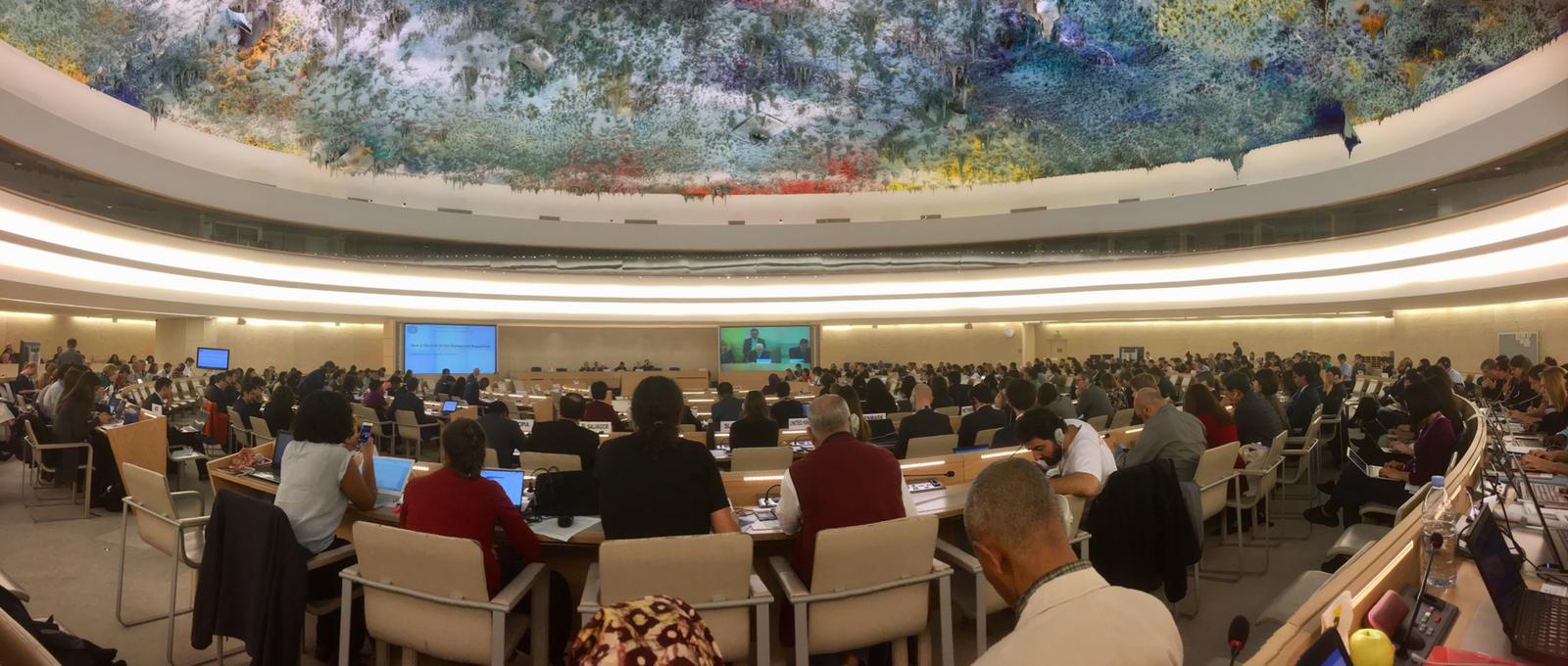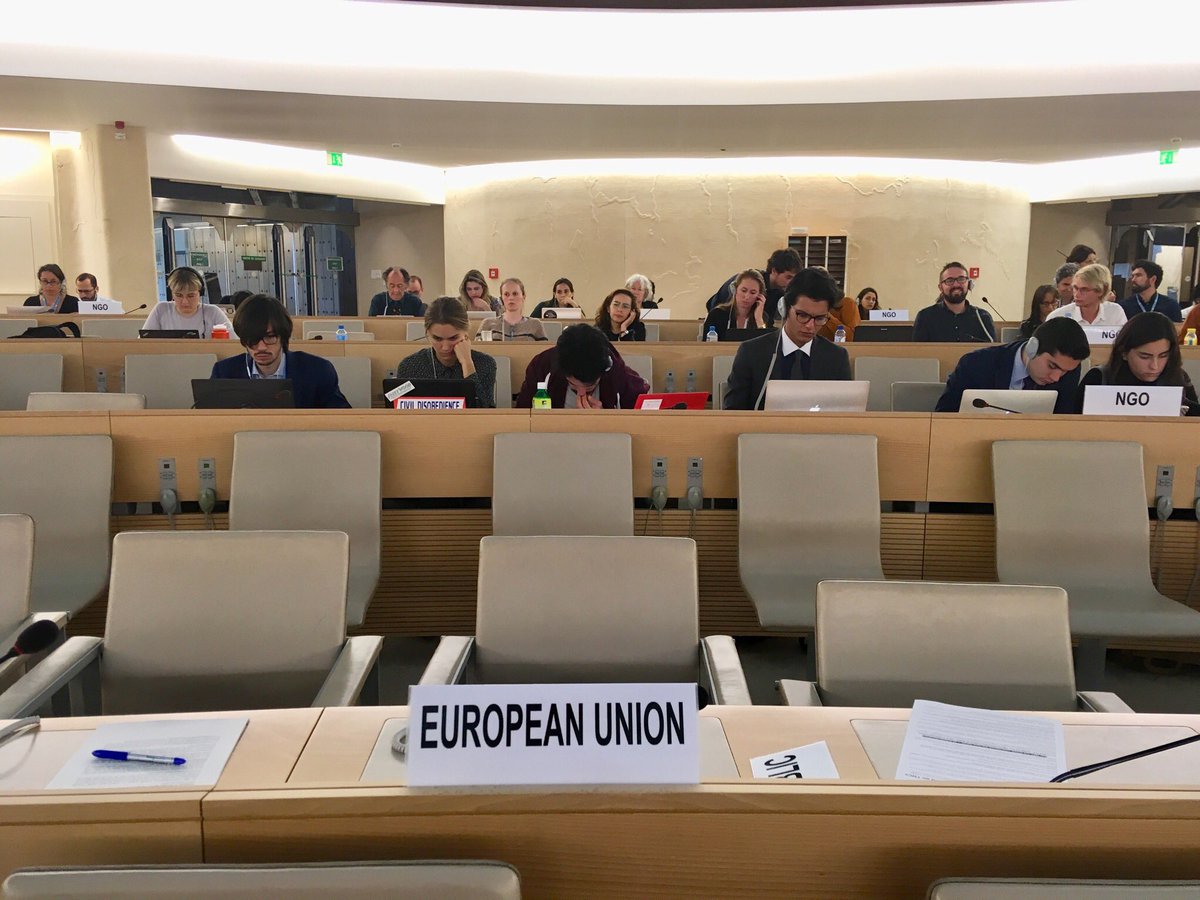
Re-cap: negotiations over the Zero Draft of a binding treaty on business and human rights
During the week of 15-19 October 2018, more than 94 States and 400 civil society organizations including SOMO were present for negotiations of the first-ever draft of a binding treaty which aims to regulate (in international human rights law) the activities of transnational corporations and other business enterprises(opens in new window) . The negotiations are part of the so-called ‘open-ended intergovernmental working group’ (IGWG) of the United Nations Human Rights Council (OHCHR). Such a binding treaty should prevent and regulate human rights abuses by corporations and should provide communities and workers worldwide with effective access to justice.
This content is available after accepting the cookies.
View on Twitter. Opens in a new windowFinally the negotiations for a UN #bindingtreaty(opens in new window) on business and human rights start today. SOMO and many members of the @TreatyAlliance(opens in new window) are ready to advocate for the best treaty for communities and workers. Let’s make this happen! https://t.co/COMx6c8uYv(opens in new window) pic.twitter.com/S8GyL6tHdi(opens in new window)
— SOMO (@SOMO) October 15, 2018(opens in new window)
The negotiations of this last week were substantial, meaningful and informative, providing fertile ground for an even larger group of States to engage. The session ended with the adoption of the report of the working group, including recommendations and conclusions on the way forward. While all BRICS countries and many States from the Global South contributed, Western States, including EU and its member states, USA and Australia were either absent or dissociated themselves from the conclusions. The Global South is thus leading the way towards a binding treaty.
SOMO’s contributions to the negotiations
To advocate effectively for a binding treaty, SOMO works together with many civil society organisations and trade unions from around the globe in the Treaty Alliance(opens in new window) and the Global Campaign to Reclaim Peoples Sovereignty, Dismantle Corporate Power and Stop Impunity(opens in new window) .
This content is available after accepting the cookies.
View on Twitter. Opens in a new windowThe outcome of the first negotiations on #bindingtreaty(opens in new window) to #StopCorporateAbuse(opens in new window) : Global South leads the way, while home states stand at the sideline. Time for change! ✊🏿✊🏾✊🏽✊🏼✊🏻 pic.twitter.com/BNXKxrjLht(opens in new window)
— SOMO (@SOMO) October 19, 2018(opens in new window)
SOMO has contributed to the negotiations by means of oral statements on the first draft of the UN binding treaty on business and human rights. More specifically, SOMO has provided substantive contributions on these elements of the draft for a UN binding treaty:
- Session on Article 2 and 8 of the Zero Draft: Oral statement on Human Rights Defenders together with FIDH, Justiça Global, LHR, Al-Haq, ESCR-net.
- Session on Article 6, 7 and 13 of the Zero Draft: Oral statement on Trade and Investment together with MISEREOR, Asia Pacific Forum on Women, Law and development, BUND, CCFD, CIDSE, CIEL and FIAN International
- Session on Article 10, 11 and 12 of the Zero Draft: SOMO Researcher Mariëtte van Huijstee presented an oral statement on Legal Liability in the Zero Draft of the UN treaty, on behalf of Greenpeace, FIDH and SOMO(opens in new window) :
This content is available after accepting the cookies.
View on Twitter. Opens in a new window“Human rights defenders are not included in the Zero Draft” of the #BindingTreaty(opens in new window) on business & human rights, says @ProfSuryaDeva(opens in new window) of the UN Working Group on B&HR. “That aspect of the draft is highly problematic. The text should build on the UN Declaration on HRDs.” @FrontLineHRD(opens in new window) pic.twitter.com/tTOcMGJjMJ(opens in new window)
— SOMO (@SOMO) October 17, 2018(opens in new window)
Additionally, SOMO released short statements in relation to content of two other sessions:
- Session on Article 1, 14 and 15: Statement on Corporate Capture together with ICAR
- Session on the Draft Optional Protocol: Statement on Enforcement, together with FIDH, Greenpeace, and OECD Watch
https://www.youtube.com/watch?v=Q0DA_5zqKVY
As negotiations advanced, the risk of corporations capturing law and policy making space — a phenomenon known as “corporate capture” that is one of the principle reasons for why this binding treaty is needed — presented itself in this UN process. In the course of the week, the International Organisation of Employers (IOE) circulated a document naming specific States and affirming that “major exports of selected treaty proponent countries may be placed at risk from treaty ratification.”
This content is available after accepting the cookies.
View on Twitter. Opens in a new windowHappening NOW @UNGeneva(opens in new window) : civil society jointly protesting #corporateCapture(opens in new window) . We dont let @ioevoice(opens in new window) blackmail States that are supportive of the #BindingTreaty(opens in new window) ! #StopCorporateImpunity(opens in new window) pic.twitter.com/twWbLlEI1k(opens in new window)
— Ike Teuling (@IkeTeuling) October 18, 2018(opens in new window)
Treaty Alliance members stood up against this misconduct calling it out on the floor of the negotiations as a direct attempt to threaten states with economic retaliation if they sign the future treaty. Treaty Alliance members maintained that they will be vigilant to preventing any future attempts by corporations to capture this process.
Civil society action as a response to IOE’s effort to pressure countries (Video: Ike Teuling, Friends of The Earth)
Toward the conclusion of the week’s negotiations, a joint statement signed by more than 170 organizations(opens in new window) from around the world called for States’ explicit commitment to next steps in the treaty development process, including a fifth session of the IGWG, informal intersessional consultations, national level consultations, and a strengthened draft one of the treaty text, while including critical inputs from civil society and affected communities.
This content is available after accepting the cookies.
View on Twitter. Opens in a new windowNasty move by the @ioevoice(opens in new window) here at the #bindingtreaty(opens in new window) negotiations in Geneva: Scaring developing countries away from the treaty process by predicting severe economic consequences #StopCorporateImpunity(opens in new window) pic.twitter.com/xEvjXM2BCd(opens in new window)
— Mariëtte van Huijstee (@Mariette_v_H) October 18, 2018(opens in new window)
EU participation in the treaty process
In the week running up to the negotiations, a majority of the European Parliament urged the European Commission to constructively engage in the negotiations for a UN Binding Treaty. In the build-up to this week of negotiations, civil society organizations wondered whether this resolution would push the EU to contribute to the substantive discussions during this IGWG session. In the past 3 years, the EU has been reluctant to engage in the process towards a UN Treaty, and last year valuable time and energy was lost due to its attempts to reduce the process to conversations around process rather than content.
This content is available after accepting the cookies.
View on Twitter. Opens in a new windowEU civil society organisations call on the EU to contribute substantively to the negotiations on the Zero Draft #bindingtreaty(opens in new window) on Business and Human Rights: https://t.co/IMTJ3JIzZD(opens in new window) @EU_UNGeneva(opens in new window) @NLinGeneva(opens in new window) @FranceONUGeneve(opens in new window) @GermanyUNGeneva(opens in new window) @irishmissionun(opens in new window) @FinlandGeneva(opens in new window)
— SOMO (@SOMO) October 15, 2018(opens in new window)
This year, the EU was present at the negotiations but, citing a lacking negotiation mandate, didn’t provide any substantive comment or questions in response to the Zero Draft of the UN treaty. Also, EU member states had been advised not to provide statements on the content on their own. This was reflected throughout the week in a general silence by the EU and Member States delegates, with the exception of France.

The lack of engagement by the EU and its Member States was also apparent outside of the central negotiation room. Together with other civil society organisations, SOMO organised a side event which aimed to explore how the UN Treaty could link to the UN Guiding Principles on Business and Human Rights (UNGPs) and could build upon relevant policy developments at the European level. Unfortunately, the event had to be cancelled because no EU Member State was willing to join the panel or engage in the discussions. Until the very end of this IGWG session there were concerns that the EU may block the adoption of the session report, which would contain recommendations and conclusions on the way forward. However, instead of objecting to the adoption of the report the EU “disassociated” itself from the conclusions. In theory, this means that the EU keeps the door open for re-engagement in the process in the future, but the apparent lacking commitment begs the question whether they will in fact join at the negotiation table again.
This content is available after accepting the cookies.
View on Twitter. Opens in a new windowCivil society’s proposal for the Conclusions and Recommendations of the Report of the 4th session of the OEIGWG #BindingTreaty(opens in new window) : https://t.co/5AmB91jpNt(opens in new window) @AustraliaUN_GVA(opens in new window) @JapanMissionUN(opens in new window) @CanadaUNGeneva @usmissiongeneva(opens in new window) @ksamissionun(opens in new window) @UNEgypt(opens in new window) @Palestine_UN(opens in new window) @BrazilUNGeneva(opens in new window) pic.twitter.com/tTGarbBtFn(opens in new window)
— SOMO (@SOMO) October 19, 2018(opens in new window)
The way ahead
The Zero Draft of the treaty draft lacks direct human rights obligations for companies, which limits the modes of enforcement contemplated in such an instrument. Effective enforcement is the ultimate litmus test for any human rights treaty, and still requires significant development in future drafts of the instrument.
This content is available after accepting the cookies.
View on Twitter. Opens in a new windowTODAY: reading of Opt. Protocol #BindingTreaty(opens in new window) on business + human rights. Joint NGO response: "Effective enforcement is the ultimate litmus test for any human rights treaty. If this treaty does not work for victims, it fails to serve its primary purpose." https://t.co/wBDmkpujIy(opens in new window) pic.twitter.com/nA1K8zxh9a(opens in new window)
— SOMO (@SOMO) October 19, 2018(opens in new window)
The EU, US, Canada, Australia, Japan and other States that are home to many powerful multinationals are absent from the negotiation table. This results in many unknowns for the development of the treaty and the possible impact at home state level. Chairing the process, will Ecuador focus on Global South instead? And how will Western States take their responsibility? Will this treaty result in prevention of violations and will it result in access to effective remedy for victims? That is how SOMO will continue to evaluate this treaty process as it develops.
Do you need more information?
-

Lydia de Leeuw
Researcher







